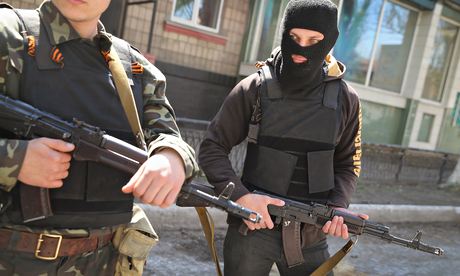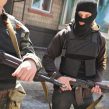
Ukraine Defines Armed Secessionists as Terrorists, Russia as Terrorism Sponsor
Publication: Eurasia Daily Monitor Volume: 11 Issue: 136
By:

Ukraine is asking Western governments and international organizations to designate the Moscow-backed Donetsk and Luhansk “people’s republics” (“DPR” and “LPR,” in Ukraine’s east) as terrorist organizations. Their political leaderships and their military units would be liable for designation as terrorist. President Petro Poroshenko, the Ukrainian parliament and the government are turning to their Western counterparts with this request.
This request has been catalyzed by the shooting down of the Boeing 777 international airliner on July 17, from “DPR”-controlled territory adjoining the Ukraine-Russia border. The shot and crash killed all 298 people from 11 countries aboard that plane. The shot was fired from an anti-aircraft missile system that had just been delivered to the “DPR” across the border from Russia. The aiming and firing might have been executed or supervised by a Russian crew. The “DPR” has sabotaged the international investigation at the crash site from the outset. Ukrainian intercepts of telephone calls between “DPR” field commanders, Donetsk secessionist authorities, and handlers in Moscow reflect their connivance in the delivery of that missile system across the border, its subsequent concealment, and obstruction of the investigation (see EDM, July 18, 21, 24).
In broader terms, however, classifying the “DPR” and “LPR” as terrorist organizations is an overdue response to methods they have employed all along. Ukraine’s international demarches, as just released, do not detail the case as to why those organizations qualify as terrorist. That case may seem self-explanatory, and substantiating open-source material is ubiquitous. These paramilitary groups conduct deadly operations against the Ukrainian police and military, take hostages and use them for trade-offs (including three separate groups of abducted observers from the OSCE—see EDM, May 6), blow up bridges and railroad tracks, and plunder arms from police stations and explosives from Donbas mines. Such patterns of action characterize terrorism. This is a cross-border undertaking from Russia, with no roots or antecedents in Donbas. But it is apt to take root if allowed to fester.
Some of those units are transitioning from hybrid war to conventional military combat using Russian-supplied hardware. Using man-portable air-defense systems (MANPADs) and newly-supplied anti-aircraft missile systems, they downed four Ukrainian military planes between July 14 and July 23 (Ukrinform, July 14, 16, 18, 23). The shooting down of the Amsterdam-Kuala Lumpur flight over secessionist-held territory on July 17 capped this spree.
Stigmatizing the two “people’s republics” as terrorist, raises ipso facto the issue of their sponsorship by Russia. Covert at the levels of operations and financing, that sponsorship is overt at the diplomatic and political levels, and strident in its encouragement of violence through Russia’s state-controlled media. These armed gangs crossed the border from Russia into Ukraine’s Donetsk and Luhansk provinces in April and consolidated their strength there in May, while Ukraine was experiencing a temporary vacuum of power. Russia’s ongoing hybrid war includes the use of terrorist methods in these two eastern provinces of Ukraine. But the country is addressing this challenge more effectively now.
Amid worldwide outcry following the July 17 atrocity, Ukraine’s parliament (Verkhovna Rada) has issued a message to European and world institutions and heads of state. Recounting the fatal attack on the airliner, the parliament explains that “it became possible due to the Russian Federation leadership’s support to these gunmen [boyeviki], supplying them with weapons, which led to acts of international terrorism.” Moreover, the “Russian Federation’s authorities are sending mercenaries and active-duty servicemen to the ‘DPR’ and ‘LPR’, for actions against Ukraine that bear all the marks of terrorism.” Accordingly, the Verkhovna Rada calls on world leaders to encourage a full investigation of the July 17 attack; classify those two “people’s republics” as terrorist; and provide Ukraine with technical assistance to defend itself against this threat.
The Ukrainian parliament has also adopted the text of a message to parliaments and governments everywhere. It addresses up front the problem of “countering the spread of international terrorism from Russia.” It observes that “Russia’s support for terrorism through the Donetsk and Luhansk ‘people’s republics’ fuels conflict” in this part of Ukraine, with ramifications now reaching far beyond Ukraine, as dramatized on July 17. The Verkhovna Rada urges parliaments and governments in Europe, North America and everywhere to designate the “DPL” and “LPR” as terrorist organizations (Ukrinform, July 22; Interfax-Ukraine, July 23).
Interviewed on CNN on July 21, President Poroshenko appealed to the United States’ government and both chambers of the US Congress to have the “DPL” and “LPR” listed officially as terrorist organizations. Poroshenko also addresses the issue of sponsorship of terrorism. He suggests that the US and other countries create by law a “list of states that support terrorist groups or cooperate with them.” Under the procedure as suggested, “any one [entity] that supports, coordinates, or finances such organizations or activities can be subjected to international sanctions” (president-gov.ua, July 21, 23; Ukrinform, July 23, 24).
Prime Minister Arseniy Yatseniuk has announced that the government is initiating procedures against Russia, based on the International Convention for the Suppression of the Financing of Terrorism (UN, accessed July 25). The Ukrainian government intends to present evidence that Russian state agencies have been directly involved in financing, arming, and training agents and paramilitary groups to commit terrorist acts on Ukraine’s territory (Interfax-Ukraine, July 23). Ukraine’s Foreign Affairs Ministry is cautioning Russia’s counterpart ministry, in an official note, that “the Russian side must immediately stop the financial and [other] forms of support for terrorist organizations in Ukraine. The disregard of international law will result in highly negative consequences for the authorities in Moscow” (Interfax-Ukraine, July 23).




